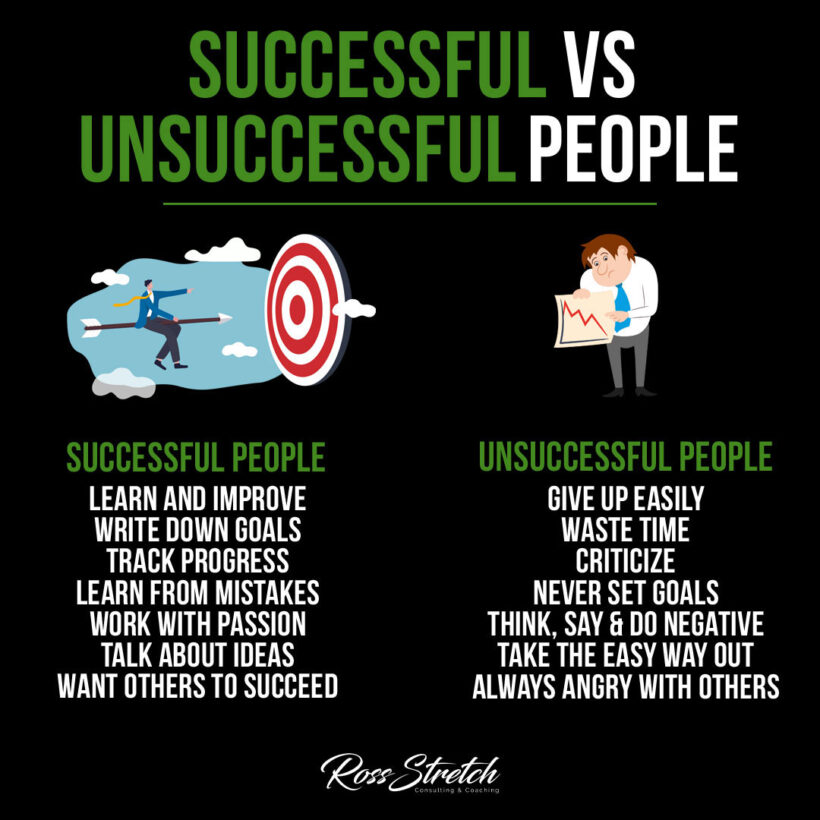Success is often seen as a combination of talent, opportunity, and luck. However, it’s our habits and mindset that play a significant role in shaping our lives. This article explores the characteristics that distinguish successful individuals from those who struggle to reach their goals. By understanding these differences, you can develop habits that drive success and avoid the pitfalls that hold people back.
1. Successful People Learn and Improve, Unsuccessful People Give Up Easily
One of the defining traits of successful people is their commitment to growth. They actively seek out opportunities to learn, improve, and adapt. When faced with challenges, they view them as learning experiences rather than roadblocks. On the other hand, unsuccessful people tend to give up when the going gets tough, viewing setbacks as failures rather than stepping stones.
- Keys to Success:
- Adopt a Growth Mindset: Embrace challenges as opportunities to learn and grow.
- Stay Resilient: Develop resilience by focusing on solutions and learning from each experience.
- Example: Thomas Edison famously tried hundreds of materials before finding the right one for the lightbulb filament. His persistence exemplifies how learning and resilience contribute to success.
2. Successful People Write Down Goals, Unsuccessful People Never Set Goals
Setting clear, written goals is a powerful habit among successful people. Writing down goals creates accountability and helps to visualize what they want to achieve. In contrast, unsuccessful people often drift without a plan, failing to set specific objectives. This lack of direction can lead to wasted time and missed opportunities.
- Keys to Success:
- Set SMART Goals: Create goals that are Specific, Measurable, Achievable, Relevant, and Time-bound.
- Review Goals Regularly: Successful people frequently review and adjust their goals as needed.
- Example: Oprah Winfrey attributes much of her success to her goal-setting habits, describing how writing down her intentions helped her stay focused on her vision.
3. Successful People Track Progress, Unsuccessful People Waste Time
Successful people track their progress to measure how close they are to reaching their goals. By keeping an eye on their milestones, they can make necessary adjustments and stay on course. Conversely, unsuccessful people often waste time on unproductive activities and fail to monitor their progress, leading to stagnation.
- Keys to Success:
- Use Productivity Tools: Apps like Trello, Asana, or even simple to-do lists can help track daily tasks and long-term goals.
- Reflect Regularly: Take time each week to review achievements and adjust your strategies as needed.
- Example: Many entrepreneurs, like Elon Musk, are known for their habit of tracking goals and iterating based on progress, helping them stay on track and adapt as they grow.
4. Successful People Learn from Mistakes, Unsuccessful People Criticize
Mistakes are a natural part of any journey, and successful people view them as valuable lessons. They take responsibility, learn from errors, and apply those lessons to future efforts. In contrast, unsuccessful people often blame others or criticize circumstances instead of looking inward and using mistakes as a springboard for growth.
- Keys to Success:
- Embrace Failure as a Teacher: Reflect on mistakes and think about what can be improved.
- Take Responsibility: Own up to your actions and focus on ways to improve.
- Example: Michael Jordan is known for saying, “I’ve failed over and over and over again in my life. And that is why I succeed.” This attitude is a common trait among successful people.
5. Successful People Work with Passion, Unsuccessful People Think, Say, & Do Negative
Passion is the fuel that drives successful people to overcome obstacles and achieve their goals. They find meaning and purpose in their work, which keeps them motivated. Conversely, unsuccessful people often adopt a negative attitude, focusing on what they dislike about their circumstances or projecting a pessimistic outlook.
- Keys to Success:
- Find Your ‘Why’: Identify what motivates you and find ways to incorporate your passions into your work.
- Maintain Positivity: A positive mindset encourages action and resilience, helping you stay focused on your goals.
- Example: Entrepreneurs like Richard Branson attribute their success to pursuing projects they are passionate about, creating a positive approach to challenges and setbacks.
6. Successful People Talk About Ideas, Unsuccessful People Take the Easy Way Out
Successful people are curious, forward-thinking, and open to discussing new ideas. They enjoy brainstorming and thinking about how to improve or create solutions. Unsuccessful people, however, often take the path of least resistance, avoiding risks and challenges. This mindset leads to complacency and a lack of progress.
- Keys to Success:
- Surround Yourself with Visionaries: Engage with people who inspire you to think big and explore new ideas.
- Seek Out Challenges: Embrace challenges as opportunities to innovate and grow.
- Example: Steve Jobs is a classic example of someone who constantly thought about ideas and was not afraid to take risks, leading to revolutionary products like the iPhone.
7. Successful People Want Others to Succeed, Unsuccessful People Are Always Angry with Others
Successful people understand the importance of collaboration and support. They celebrate the achievements of others and look for ways to lift others up, believing that success is not a zero-sum game. In contrast, unsuccessful people often harbor resentment, becoming angry or envious of others’ success.
- Keys to Success:
- Practice Empathy: Encourage and support the growth of others; it builds goodwill and fosters a positive environment.
- Collaborate and Share Knowledge: Mentoring others and sharing insights creates a cycle of success and growth.
- Example: Warren Buffett, known for his mentorship and generosity, emphasizes that helping others succeed is a critical part of his own success.
Conclusion
The differences between successful and unsuccessful people boil down to mindset, habits, and behaviors. Successful individuals embrace growth, set clear goals, and maintain a positive outlook, while unsuccessful people often give in to negativity, lack focus, and criticize. By adopting the habits of successful people, you can create a mindset that drives achievement and helps you reach your goals.


